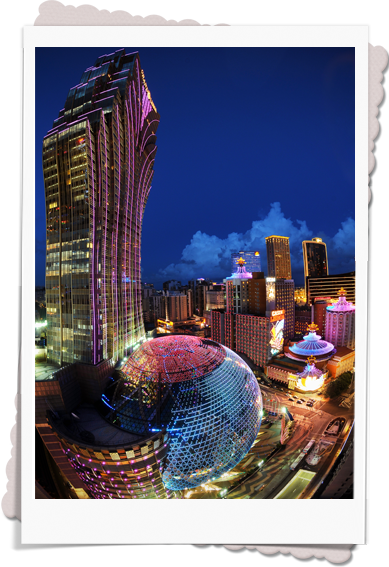
 First step toward Macao casino exclusion
First step toward Macao casino exclusion
By Rosalind Wu, Michelle Guo, Maggie Zhao, Bailey Liu
While the gaming industry boosts Macao’s economy, inevitably, it is accompanied by many social problems. The “Symposium on Responsible Gambling: People, Practice and Policy”, the hallmark event of the “Responsible Gambling Awareness Week 2010”, was held by the Hong Kong Polytechnic University and University of Macau (UM) this year, specially raised the issue about increasing the minimum age for entering casinos from 18 to 21.
“The effect of this suggestion is obvious. At least the number of people involved in gambling will decrease in general,” says Loi Kuai Chun, a staff member of Confraternidade ev Angelistico Industrial de Macau, “It is the time for youngsters to receive higher education at the age of 18 to 21. Gambling as well as working for casinos will affect their study mentally. As we know, on one hand, finishing college or above education will benefit youngsters’ future career, on the other hand, the situation of lacking people with higher education in Macao will be improved.”
Moreover, according to the Study on the Formation of Problem Gambling among Youngsters in Macao, conducted by the Institute for the Study of Commercial Gaming (ISCG), UM, youngsters have a higher rate of becoming problem gamblers and even pathological gamblers than other age groups.
However, opposite views also exist. Since this suggestion also implies the raising of the minimum age for workers in casinos, the adoption of this policy would aggravate the problem of labor shortage in Macao and inevitably increase the operational costs of casinos.
Reference to other countries and areas such as Las Vegas in the US, Singapore and Malaysia and so on, Macao is not the first place to consider the age of 21 as the minimum age for casinos. “Raising the age threshold is better than not to do it. From my point of view, the ‘21-year-old policy’ is sure to be implemented,” Dr. Davis Fong Ka Chio, director of ISCG points out. “It’s just a starting point and Macao needs a better central controlling system to improve its casino exclusion.”
The age limitation is not the whole story of the casino exclusion. Fong also said that they have already submitted a report to the government, suggesting that several different kinds of exclusions should be introduced.
- Civil servants are not allowed to enter.
- People whose livelihood is supported by the government are not allowed to enter. (e.g. the population lives on the social assistance program.)
- Gamblers, applying for exclusion themselves, are not allowed to enter. - Gamblers, applying for exclusion by their relatives, are not allowed to enter.
- Gamblers, applying for exclusion by casinos, are not allowed to enter.
“The difficulty we are facing is not that we have no policy of casino exclusions, but a lack of a central processing approach. This seems to be a dominant resistance,” says Fong.
Take Singapore as an example: there are over 500 approved applications for casino exclusion from Sands Singapore only during the first month after it opened to the public. Every Singaporean can apply for casino exclusion for himself/herself. "Compared with Singapore," Fong said, "the application procedure for casino exclusion in Macao is far more complicated and time-consuming, which requires,
but is not limited to, piles of certificates to approve that you are qualified for applying, lists of reasons why you need the exclusion and a long period waiting for approval. Consequently, Macao citizens are seldom willing to spend this much time on an application, although most of them are needed."
This group of reporters browsed the official website of the Gaming Inspection and Coordination Bureau Macao SAR (DICJ) and found detailed information of the organization, legislation, rules and ser vice, etc. but failed to find the information on application for casino exclusion, including application qualifications, application forms, fees, a procedure and acceptance duration, nor did we find related data in recent years. As for this, DICJ replies, "DICJ receives more than a dozen applications for casino exclusion per year. However, we are waiting to post the official guidance onto our official website since the legislation of casino exclusion application is still under the draft and review period."
Beyond that, there is also an existence of resistance, i.e. the deep-rooted Chinese traditional concept: to hide the skeleton in the closet. Macao is not a big place and a message can be spread swiftly just within a few days. Accordingly, it 's not surprising to know that Macao residents worry about the possible revelation
of the name list for casino exclusion. People would feel ashamed if someone who knows them finds out that there's a problem gambler in their family, which additionally leads to the low figure of applications per year.
Since 2001, the liberalization of the gambling industry in Macao has ushered in an economy which is led by the gambling industr y and structured around this single industry. In addition, from 2009, the gambling tax revenue in Macao exceeded that of the global leading gambling centre, Las Vegas. Under this circumstance, it is essential that the Macao gambling industry is to maintain a healthy and sustainable pattern of development. So the "21-year-old policy " is just a brand new start, while the main task that requires more thought and effort is the promotion of responsible gambling, the improvement of the casino exclusion scheme and the development of industrial diversification.
Want to know if your are a problem gambler? Click HERE to do a QUIZ.